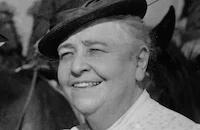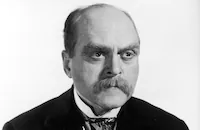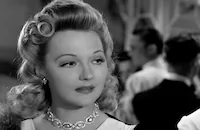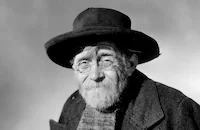One More Spring
Cast & Crew
Henry King
Janet Gaynor
Warner Baxter
Walter King
Jane Darwell
Roger Imhof
Film Details
Technical Specs

Synopsis
After holding a bankruptcy auction at his failed New York antique store, the now-broke proprietor, Otkar, offers the remaining food he has to an out-of-work violinist, Morris Rosenberg. Because they are now both homeless, they transport Otkar's large bed, which he failed to sell even though he claimed that Napoleon had slept in it, to the park, where they sleep. Elizabeth Cheney, an actress who has not been able to find work in the seven months that she has been in New York, sleeps in the subway. In the morning, as Otkar looks for a new place for the bed, Elizabeth passes Morris, who is practicing his violin, and offers to pass the hat for him. Insulted that she thinks he is a beggar, he lashes out and she leaves. However, a crowd soon gathers and applauds Morris' "performance." When Michael Sweeney, a park maintenance man, asks Morris to teach him to play his favorite song, "Macushla," Otkar strikes a deal with Sweeney to trade violin lessons for permission to set up the bed in the stables where Sweeney keeps his tools. At night in the rain, Otkar and Elizabeth meet as they both attempt to steal a chicken from the window of a fancy restaurant. When the cook and others chase them, they hide under his umbrella and pose as lovers. Elizabeth then implores Otkar to let her stay in the stables, and Otkar agrees, but Morris, recognizing her, objects. When she collapses from hunger, however, he fixes tea, which Sweeney has brought, for her. Although Elizabeth begins the evening sleeping in the manger, by the morning she has joined the men in bed because of the cold. After Otkar steals some meat from the zoo that was supposed to be fed to the lions, they borrow a stew pan from Mrs. Sweeney and have a feast. Meanwhile, Mr. Sheridan, the president of the bank where Mrs. Sweeney works as an elevator operator, worries that the bank will fail and that people like Mrs. Sweeney will lose their savings. As Christmas approaches, Morris meets a flutist playing near the subway entrance and gives him his fur-collared coat to borrow so that he will look like a professional when he goes to ask for relief from the musicians' bureau. When the bank fails, the Sweeneys take comfort that they still have their health. Sheridan, however, attempts to jump from a bridge in the park, but ends up stuck in the mud. Otkar helps him out and brings him to the stable, where Sheridan asks to stay. After an argument with Otkar, Elizabeth leaves, but she returns later with a blanket, medicine and food. She then angrily refuses to answer Otkar's inquiries about where she got the money to buy the items, but she brightens when he says that the two hours he searched for her were the most miserable he has ever spent. The week before Easter, Otkar and Elizabeth talk Sheridan into returning to his bank and facing his depositors. On Easter, Morris leaves, as the man to whom he lent his coat has gotten him a job in the symphony orchestra in Oswego. Otkar and Elizabeth realize that they can no longer share the stable alone, and after offering her the bed, Otkar plans to travel South. She then reveals that she borrowed the blanket and money from Mrs. Sweeney. Sheridan visits and tells them that the government has given aid to the bank and that the depositors will not lose a penny. Sheridan also tells Otkar that he has plans for him and wants to buy the bed. Otkar and Elizabeth then argue about who owns the bed, and without thinking, he calls her "darling." Realizing that they are in love, they decide to wait and take the trip South together, on their honeymoon.

Director
Henry King
Cast

Janet Gaynor

Warner Baxter
Walter King

Jane Darwell
Roger Imhof

Grant Mitchell
Rosemary Ames

John Qualen

Nick Foran

Astrid Allwyn
Lee Kohlmar

Stepin Fetchit
Blanche Payson
Harry Depp

Charles Levison
Bobby Caldwell
Jayne Regan
Gus Reed
William Irving
Jack Norton

Jack Mower
Russ Clark
Michael S. Visaroff
Harry Harvey
Jill Dennett
William Strauss
William Wagner
Walter Downing
Tina Marshall
Bobby Dunn
Esther Michelson
John Gough
Arthur Stuart Hull
William Arnold
Don Brody
Creighton Hale
Stewart L. James
Monya Andre
Grace Goodall

Lloyd Ingraham
John T. Dillion
Billy Sullivan

Christian Rub
Barrett Greenwood
Frank Dufrane
George Bunny
Bob Stanley
Mary Alden
James Gordon
Allen Caven
Paul Weigel
Jack Mack
Crew
Joseph Aiken
J. Bryant
Edwin Burke
Teodoro Cottrau
William A. Drake
Stepin Fetchit
William Lambert
Arthur Lange
B. F. Mceveety
Jack Otterson
Harold Schuster
John Seitz
Winfield Sheehan
Pinky Tomlin
Keith Weeks

Film Details
Technical Specs

Quotes
Trivia
Notes
In a New York Times news item from 1938, director Henry King stated that he made this film "on an impulse" and thought that it was "probably his best picture in a way." Included in the first draft of the treatment for the film, in the Twentieth Century-Fox Produced Scripts Collection at the UCLA Theater Arts Library, is the following statement of intent in producing a film based on the Nathan book: "...it has all the attractive qualities of It Happened One Night....the depression angle May easily be eliminated and would help rather than hinder the story....This is an opportunity of producing a 'A Theatre Guild' type of play on the screen. Not an 'arty' sort of thing aimed at small audiences but one with general appeal and as easy to understand as Ah, Wilderness." The New York Times review commented that the film abandoned "all but the leanest suggestion of Mr. Nathan's satirical implications" and pointed out that the character played by Janet Gaynor, "out of deference to the Legion of Decency and Miss Gaynor's following, has abandoned the scarlet vocation which the author designed for her and has now become an unemployed actress." According to correspondence in the MPAA/PCA Collection at the AMPAS Library, writer Edwin Burke agreed to rewrite two scenes in which there was the "definite suggestion...that Elizabeth has really gone out into the street to solicit men for purposes of prostitution" after PCA director Joseph Breen objected "that Gaynor engaged in playing a girl who would stoop to prostitution in order to get money would result in the most violent shock to audiences everywhere" and that the scene would be in violation of the Production Code. In the offending scenes, according to the PCA documents, "Elizabeth" "approaches a man, who counters by asking her for a dime" and then approaches the character "Sheridan." Burke agreed to delete the first scene and assured Breen that the second scenes would be played so that "no definite indication that Gaynor's meeting with him was prompted by any thought of 'selling'."
According to information in the Twentieth Century-Fox Records of the Legal Department, also at UCLA, this film was originally on Will Rogers' schedule. Also, according to the legal records, Joe Cunningham wrote the first draft of the treatment, but Edwin Burke did not use any of Cunningham's material.
In August 1954, Robert Nathan received an offer for a license for a version of the book to be presented over live television. Although he believed that he owned the rights regarding this, according to his 1933 contract with Fox, he apprised Twentieth Century-Fox of the situation and requested their clearance. The studio replied that it owned the rights, and Nathan sued them. To dispose of the case, the studio made arrangements with Nathan's attorneys to amend the 1933 contract so as to provide that Nathan reserve to himself the live television rights. No information has been located concerning a subsequent broadcast based on the book.












